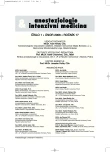-
Medical journals
- Career
The prospective study on the effect of a preemptive long-term postoperative administration of a low-dose ketamine on the incidence of chronic post-mastectomy pain
Authors: J. Málek 1; A. Kurzová 1; M. Bendová 2; P. Nosková 1,3; M. Strunová 1,4; T. Vedral 5
Authors‘ workplace: Klinika anesteziologie a resuscitace, 3. LF UK a FNKV, Praha 1; Klinika gynekologie a porodnictví, 3. LF UK a FNKV, Praha 2; Anesteziologicko-resuscitační klinika, 2. LF UK a VFN, Praha 3; Klinika gynekologie a porodnictví, 2. LF UK a VFN, Praha 4; Klinika chirurgie, 3. LF UK a FNKV, Praha 5
Published in: Anest. intenziv. Med., 17, 2006, č. 1, s. 34-37
Category: Algeziology - Original Article
Overview
Objective:
The N-methyl D-aspartate receptor is involved both in the postoperative central sensitization and the development of chronic postoperative pain. Its antagonist ketamine is used for the enhancement of postoperative analgesia and treatment of chronic pain. There is little information concerning the long-term effect of perioperative administration of ketamine on chronic pain. We have designed a study to test the hypothesis that pre-emptive and long-term postoperative administration of low-dose ketamine lowers the incidence of chronic postoperative pain.Design:
Prospective, blind clinical trial.Setting:
Dept. of Anaesthesiology and Intensive Care, Charles University Prague.Material and Method:
After the institutional ethics committee approval and written consent, 100 total or partial mastectomy patients were randomly assigned to the control (C) or ketamine (K) groups. Group K patients were blindly commenced on continuous infusion of ketamine 1.0 mg . kg⁻¹.day⁻¹ for 48 hours after the induction of anaesthesia, group C were administered normal saline. The general anaesthesia, surgical procedure and post-operative care were standard and not different between the groups. Six months after the surgery we sent the patients a questionnaire concerning the incidence and characteristics of chronic pain.Results:
There was no difference in demography, type of surgery, postoperative course and postoperative pain intensity between the groups. We retrieved 40 questionnaires from group C and 46 from group K (the response rate was 86 %). The incidence of chronic pain in group C vs. group K was 14 (35 %) vs. 14 (30 %), the pain was permanent in 5 (36 %) vs. 2 (14 %) and more intense than mild in 9 (64 %) vs. 5 (35 %) respondents. Due to the sample size, the results were not statistically significant (P = 0.15 and 0.2).Conclusion:
Low-dose ketamine administered for 48 hours after mastectomy exhibits a trend towards reduction of the incidence of permanent and moderate to severe post-mastectomy chronic pain.Key words:
ketamine – preemptive analgesiology – mastectomy – chronic pain
Labels
Anaesthesiology, Resuscitation and Inten Intensive Care Medicine
Article was published inAnaesthesiology and Intensive Care Medicine

2006 Issue 1-
All articles in this issue
- Antifibrinolytic agents in off-pump cardiac surgery: analysis of blood loss, safety and cost-effectiveness
- Oxygen transfer and pulmonary hypertension as predictors of early mortality in lung transplant patients
- Vascular anaesthesia at the beginning of the third millenium
- The cardiovascular system in the elderly and perioperative risk
- The prospective study on the effect of a preemptive long-term postoperative administration of a low-dose ketamine on the incidence of chronic post-mastectomy pain
- Current methods of mechanical circulatory support
- The controversial role of ventilation during cardiopulmonary resuscitation
- Anaesthesiology and Intensive Care Medicine
- Journal archive
- Current issue
- Online only
- About the journal
Most read in this issue- Vascular anaesthesia at the beginning of the third millenium
- The cardiovascular system in the elderly and perioperative risk
- Antifibrinolytic agents in off-pump cardiac surgery: analysis of blood loss, safety and cost-effectiveness
- The prospective study on the effect of a preemptive long-term postoperative administration of a low-dose ketamine on the incidence of chronic post-mastectomy pain
Login#ADS_BOTTOM_SCRIPTS#Forgotten passwordEnter the email address that you registered with. We will send you instructions on how to set a new password.
- Career

